PRINCETON, NJ -- Americans are generally supportive of President Barack Obama's nomination of Judge Sonia Sotomayor to the U.S. Supreme Court. A majority of Americans, 54%, say they would like to see the Senate confirm her to the Court, according to a May 29-31 USA Today/Gallup poll. Currently, 28% are against her confirmation and 19% have not yet formed an opinion.
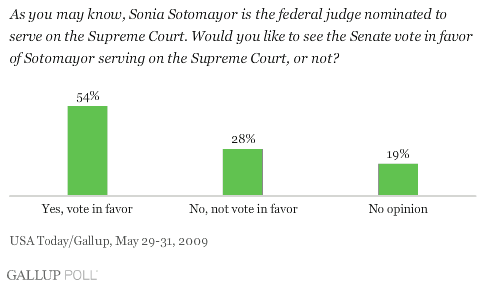
The level of support for Sotomayor is similar to what Gallup initially found for past nominees who were confirmed by the Senate, including Clarence Thomas, Ruth Bader Ginsburg, and Samuel Alito. Americans were slightly more positive toward John Roberts' nomination.
Notably, two nominees who did not make it to the Supreme Court -- Robert Bork (who was rejected in the Senate vote) and Harriet Miers (who withdrew) -- received significantly lower initial support.
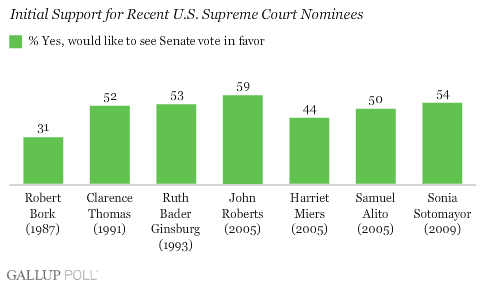
Initial public support has been a good barometer of the public's eventual judgment of the nominees. The percentage favoring a nominee's confirmation generally has not varied much in either direction from the time of nomination to the time of confirmation. Even the high-profile confirmation hearings for Thomas did not move support for his nomination below the majority level, though opposition did increase from 17% to 30% from July to October 1991.
At this early stage, a majority of Republicans, 57%, already oppose Sotomayor's nomination. Meanwhile, a slim majority of independents and a solid majority of Democrats favor it.
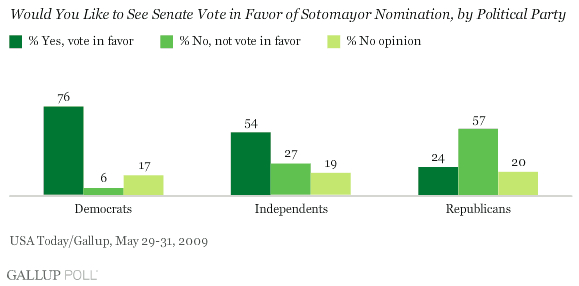
Last week, Gallup's one-night reaction poll to the Sotomayor nomination found significant gender differences when Americans were asked to rate Obama's choice as excellent, good, only fair, or poor. In the current poll, however, there is no similar gender gap, as men (55%) and women (52%) are about equally likely to say they favor Sotomayor's confirmation.
Sixty percent of Americans say they are following the news about the Sotomayor nomination closely, including 20% who are following it very closely. Support for confirmation does not vary greatly by the level of attention being paid to the story; the main differences are in the extent to which people oppose it or have no opinion.
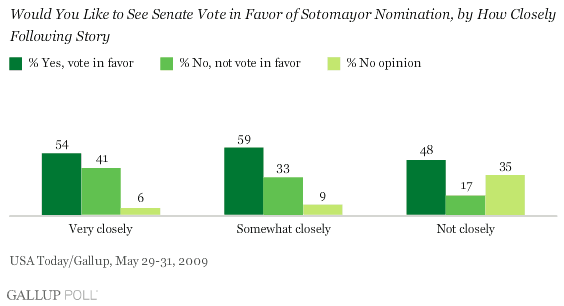
To date, much of the news focus has been on the historic importance of the nomination of potentially the first Hispanic and the third female justice, and on controversial remarks Sotomayor has made during public speeches. In a speech at Duke University in 2005, Sotomayor asserted that most public policy is made in the courts, and in a speech before a Latino group at the University of California at Berkeley in 2001, she implied that a female Hispanic judge would make better decisions on cases than a white male judge.
So far, despite the news about those statements, Americans do not view Sotomayor as an extreme nominee. Just 28% believe she would be "too liberal" as a Supreme Court justice, while the plurality of 48% say she would be "about right." This is similar to what Gallup has found when asking about prior nominees -- about half have said the nominee's rulings would be appropriate, with smaller minorities believing they would be too liberal or too conservative, depending on perceptions of the justice's ideology.
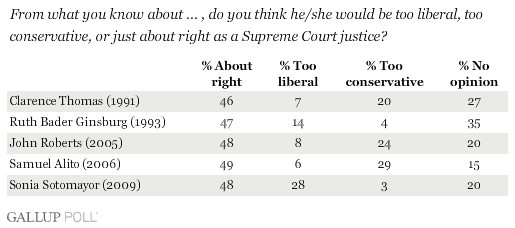
A separate question finds 49% saying they think Sotomayor's views are "in the mainstream," compared to 30% who believe they are "too extreme." That is no different from what Gallup found for Alito (the only prior nominee about whom Gallup asked this question).
At this point, even Republicans are far from united in thinking that Sotomayor's views are too extreme -- 50% believe they are, but 28% think her views are in the mainstream and the remainder has not formed an opinion.
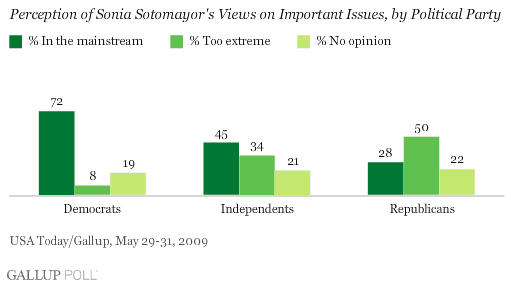
Implications
Public opinion about Sotomayor's nomination to the Supreme Court is right in line with what Gallup has found for other nominees who now serve on the nation's highest court. Past polling would indicate that, in the coming weeks and months, the initial level of support for Sotomayor is not likely to change much. Such polling shows that the main effect of the confirmation process appears to have been to move more Americans from an undecided position to a position in opposition to the nomination, but rarely has support moved dramatically up or down.
This suggests that, to a large degree, first impressions of Supreme Court nominees are lasting. Presumably, this would especially be the case among Americans who are predisposed to support the president on almost any decision he makes -- namely, his party's supporters. Already, three-quarters of Democrats favor the Sotomayor nomination.
The historical data also suggest that Americans' first impressions generally predict the ultimate Senate vote -- the two nominees who did not garner majority support from Americans on their initial reading did not wind up as Supreme Court justices. All those who were favored by a majority were confirmed, regardless of the specifics of their confirmation processes.
Survey Methods
Results are based on telephone interviews with 1,015 national adults, aged 18 and older, conducted May 29-31, 2009. For results based on the total sample of national adults, one can say with 95% confidence that the maximum margin of sampling error is ±3 percentage points.
Interviews are conducted with respondents on land-line telephones (for respondents with a land-line telephone) and cellular phones (for respondents who are cell-phone only).
In addition to sampling error, question wording and practical difficulties in conducting surveys can introduce error or bias into the findings of public opinion polls.
